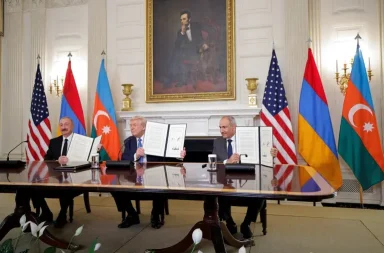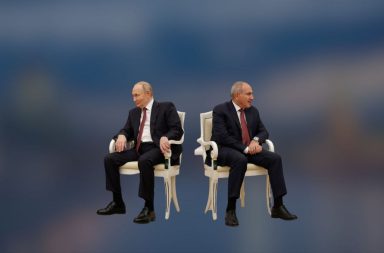by David Bishop
Volodya Grigoryan, the newly elected mayor of Parakar, was assassinated outside his home in an attack that also claimed the life of a police officer and left another individual in critical condition. The shooting occurred late at night on Tuesday, September 23.
Footage has surfaced online showing the murder of Parakar community head Valodya Grigoryan and his associate, police officer Karen Abrahamyan.
According to the Ministry of Internal Affairs, police received a report at 11:52 p.m. on September 23 about gunfire on Yerevanyan… https://t.co/CodHs0uO44 pic.twitter.com/HCOReEdEzG
— 301🇦🇲 (@301arm) September 24, 2025
The town of Parakar is located in the Armavir Province, close to Yerevan and the Zvartnots International Airport. The most recent population data for Parakar puts the population at 9,297.
Parakar had become a key battleground in Armenia’s shifting political landscape. Though 2025 is not a major election year in Armenia, elections on the local level are often used as hints of the political atmosphere before large national elections. Thus, it became notable news when the Armenian opposition took control of the mayorship and Council of Elders in the city of Gyumri this year, defeating the Civil Contract party in the local elections. Later in the summer, the mayor of Parakar was also elected as the Civil Contract candidate was defeated. This makes Parakar one of the first towns where President Nikol Pashinyan’s ruling bloc has suffered defeat to the opposition. Volodya Girgoryan’s decisive victory by the opposition “Unity” alliance became one local symbol heralding the decline in popularity of the ruling Civil Contract party. That symbol has now been violently erased.
Together with the opposition victory in Gyumri led by Vardan Ghukasyan of the opposition Armenian Communist Party, these victories have been viewed as an early preview of opposition strength in Armenia’s 2026 parliamentary elections, and demonstrate that even the Pashinyan government’s control over local administrative and informational resources do not necessarily ensure the ruling party’s electoral success.
Grigoryan’s killing underscores how Armenia’s political struggle is increasingly spilling beyond the ballot box. As the government’s grip weakens, observers warn that the risks of escalation and radicalization are on the rise, especially in the wake of major upcoming elections that could determine the foreseeable fate of Armenia, and which the ruling party may be determined to win at all costs.
Mounting dissatisfaction with government policies has given opposition leaders fresh momentum. Regardless of who ultimately benefits from such an attack, such incidents are deepening the sense of political turbulence across the country. Moreover, though political motivations behind this attack are not confirmed, blame is nonetheless cast on the ruling party simply for the phenomenon of significantly increased violent crime in Armenia. Armenia is still very low in violent crime (compared, at least, to Western countries), yet armed robberies and gun-related crimes have been recorded with substantial increases throughout Pashinyan’s premiership, with a 40% increase since 2023. Pashinyan recognized this as “a very big problem” in November 2024.
Some opposition representatives have suggested that the assassination of Grigoryan in Parakar could indeed have been a political machination connected to the ruling party. Some have suggested this is “sending a message” to the opposition ahead of elections, while member of Parliament Kristine Vartanian stated: “This is what happens when the government is busy doctoring recordings, arresting an 18-year-old citizen, entering the Patriarchate and taking revenge on a benefactor, instead of foiling real criminal plans.”


